
The Temptations are an American vocal group from Detroit, Michigan, who released a series of successful singles and albums with Motown Records during the 1960s to mid 1970s. The group's work with producer Norman Whitfield, beginning with the Top 10 hit single "Cloud Nine" in October 1968, pioneered psychedelic soul, and was significant in the evolution of R&B and soul music. The band members are known for their choreography, distinct harmonies, and dress style. Having sold tens of millions of albums, the Temptations are among the most successful groups in popular music.
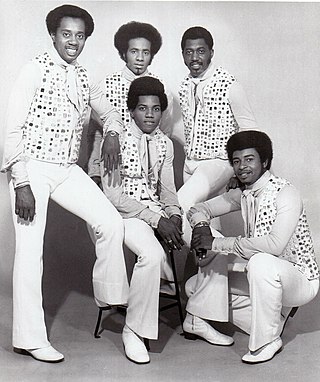
Norman Jesse Whitfield was an American songwriter and producer, who worked with Berry Gordy's Motown labels during the 1960s. He has been credited as one of the creators of the Motown Sound and of the late-1960s subgenre of psychedelic soul.
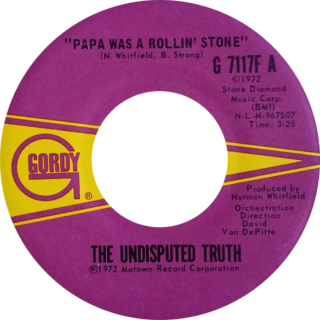
"Papa Was a Rollin' Stone" is a song originally performed by Motown recording act the Undisputed Truth in 1972, though it became much better known after a Grammy-award winning cover by the Temptations was issued later the same year. This latter version of the song became a number-one hit on the Billboard Hot 100.

"Get Ready" is a Motown song written by Smokey Robinson, which resulted in two hit records for the label: a U.S. No. 29 version by The Temptations in 1966, and a U.S. No. 4 version by Rare Earth in 1970. It is significant for being the last song Robinson wrote and produced for the Temptations, due to a deal Berry Gordy made with Norman Whitfield, that if "Get Ready" did not meet with the expected degree of success, then Whitfield's song, "Ain't Too Proud to Beg", would get the next release, which resulted in Whitfield more or less replacing Robinson as the group's producer.

"I Can't Get Next to You" is a 1969 No. 1 single recorded by the Temptations and written by Norman Whitfield and Barrett Strong for the Gordy (Motown) label. The song was a No. 1 single on the Billboard Top Pop Singles chart for two weeks in 1969, from October 18 to October 25, replacing "Sugar, Sugar" by the Archies and replaced by "Suspicious Minds" by Elvis Presley. The single was also a No. 1 hit on the Billboard Top R&B Singles for five weeks, from October 4 to November 1, replacing "Oh, What a Night" by the Dells, and replaced by another Motown song, "Baby I'm For Real" by the Originals.

Psychedelic Shack is the twelfth studio album by The Temptations for the Gordy (Motown) label released in 1970. Completely written by Norman Whitfield and Barrett Strong and produced by Whitfield, Psychedelic Shack almost completely abandoned the "Motown Sound" formula, instead delving fully into psychedelia. Along with the hit title track, the album also features the group's original version of "War", which became a major hit for Edwin Starr later in 1970.

The Undisputed Truth was an American Motown recording act assembled by record producer Norman Whitfield to experiment with his psychedelic soul production techniques. Joe "Pep" Harris served as main lead singer, with Billie Rae Calvin and Brenda Joyce Evans on additional leads and background vocals.

"Ball of Confusion (That's What the World Is Today)" is a 1970 hit single by the Temptations. It was released on the Gordy (Motown) label, and written by Norman Whitfield and Barrett Strong.
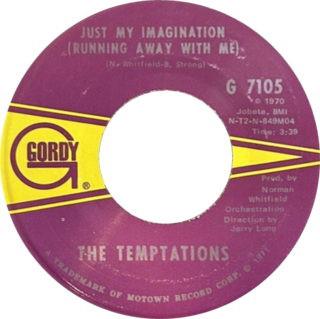
"Just My Imagination (Running Away with Me)" is a song by American soul group the Temptations, written by Norman Whitfield and Barrett Strong. Released on the Gordy (Motown) label, and produced by Norman Whitfield, it features on the group's 1971 album, Sky's the Limit. When released as a single, "Just My Imagination" became the third Temptations song to reach number one on the US Billboard Hot 100. The single held the number one position on the Billboard Pop Singles Chart for two weeks in 1971, from March 28 to April 10. "Just My Imagination" also held the number one spot on the Billboard R&B Singles chart for three weeks, from February 27 to March 20 of that year.
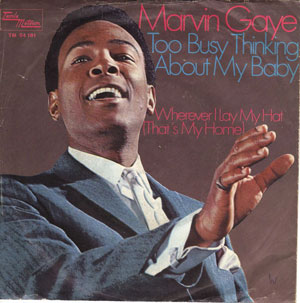
"Too Busy Thinking About My Baby" is a Motown song written by Norman Whitfield, Barrett Strong, and Janie Bradford. The song was first recorded by The Temptations as a track on their 1966 album Gettin' Ready. Eddie Kendricks sings lead on the recording, which was produced by Whitfield. Jimmy Ruffin also recorded a version with The Temptations providing background vocals in 1966. It remained unreleased until 1997.
"(I Know) I'm Losing You" is a 1966 hit single recorded by the Temptations for the Gordy (Motown) label, written by Cornelius Grant, Eddie Holland and Norman Whitfield, and produced by Norman Whitfield.

Sky's the Limit is the fourteenth studio album by the Temptations, released in 1971 through Gordy Records. The album includes the #1 hit "Just My Imagination ", the Top 40 hit "Ungena Za Ulimwengu ", and the original version of "Smiling Faces Sometimes", later a Top 5 hit for The Undisputed Truth.

Solid Rock is the fifteenth studio album by The Temptations for the Gordy (Motown) label, produced by Norman Whitfield. The LP was the first made primarily without founding members and original lead singers Eddie Kendricks and Paul Williams. Frustrated by conflicts and fights with Temptations Otis Williams and Melvin Franklin, and producer Whitfield's steadfast insistence on producing psychedelic soul for the group when they really wanted to sing ballads, Kendricks had quit the act and negotiated a solo deal with Motown's Tamla label.

"Superstar (Remember How You Got Where You Are)" is a 1971 hit single for the Gordy (Motown) label, recorded by The Temptations and produced by Norman Whitfield. Something of an early ancestor to the "diss songs" prevalent in hip hop music towards the end of the 20th century, "Superstar" is an attack at two former Temptations members, David Ruffin (who had been fired back in 1968) and Eddie Kendricks (who quit the act in early 1971 and negotiated a Motown solo deal). The song appears on the 1972 album Solid Rock.
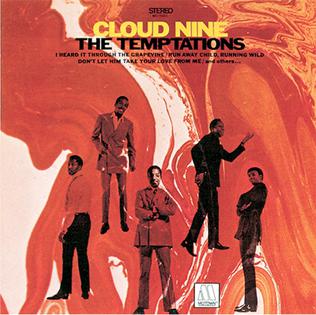
Cloud Nine is the ninth studio album by American musical group The Temptations for the Gordy (Motown) label released in 1969.
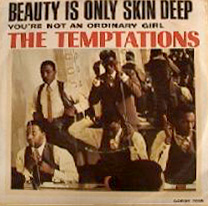
"Beauty Is Only Skin Deep" is a 1966 song, written by Norman Whitfield and Edward Holland, Jr., and produced by Whitfield. Norman Whitfield recorded the song's instrumental track. Two years later, Whitfield got together with Eddie Holland to have lyrics written for the song.
"The Girl's Alright with Me" is a 1964 song recorded by The Temptations for the Gordy (Motown) label. The B-side to their Top 40 hit "I'll Be in Trouble", the song was also able to chart on its own, peaking at number 102 on Billboard Pop Charts. It was written by Eddie Kendricks, Norman Whitfield, and Eddie Holland, and produced by Whitfield. Whitfield would rerecord the song with his act The Undisputed Truth some ten years later for their album Down To Earth.
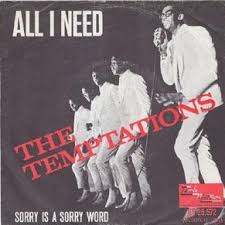
"All I Need" is a 1967 hit single recorded by The Temptations for the Gordy (Motown) label. It is the group's first single to be produced by Norman Whitfield's protégé Frank Wilson. Written by Wilson, Eddie Holland and R. Dean Taylor, the single was a Top 10 hit on the Billboard Hot 100, peaking at number 8; it was also a number-two hit on the Billboard R&B singles chart.
"(Loneliness Made Me Realize) It's You That I Need" is a 1963 song that became a 1967 hit single recorded by the Temptations for the Gordy (Motown) label, produced and co-written by Norman Whitfield. Billboard described the single as a "groovy rocker" that "is loaded with excitement and another top vocal workout."
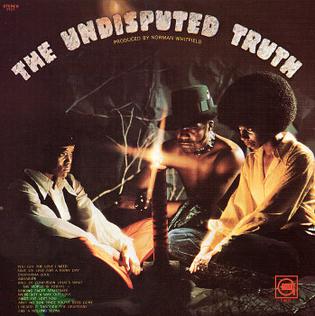
The Undisputed Truth is the self-titled debut album of the Motown group of the same name.

















